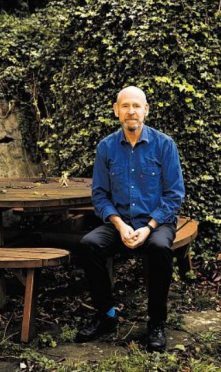Dr William Bloom is well spoken, and somehow manages to be both calming and disarming all at once, so direct is his manner.
He insists on being called William rather than Doctor Bloom, and his passion for his area of expertise is obvious.
But William is no ordinary doctor, and he is ready and waiting for the cynicism and disbelief which surrounds his field.
For William is a leading pioneer in spirituality and is launching the first nationally accredited diploma course for Spirituality & Wellness at Findhorn College, near Forres, in the autumn.
Admissions are now open, and William hopes to pass on knowledge which can ultimately enable people to lead healthier and happier lives.
Now 68, he has spent decades studying spirituality but also has some less traditionally calming hobbies.
With two children and three stepchildren, he lives in Glastonbury with his wife, Sabrina.
“My main hobby is actually motorcycles which you might not expect, and I think that’s what surprises people about spirituality,” he said.
“It’s not about crystals, it’s about connecting with life.”
In an age of ever advancing medicine, William believes spirituality has found its rightful place and is gradually being recognised by the medical profession.
The course qualifies as a level three diploma in the health and social care sector.
But what exactly is spirituality, and can it really be of any benefit in comparison to standard health care?
William certainly believes this to be the case, but admits he will only feel pride once the cause has really lifted off the ground and all 35 places are filled.
“When people ask me about spirituality, that’s exactly what I want them to do,” he said.
“It’s a brilliant question and underpins the entire course.
“I understand the cynicism but there has been a major culture shift when it comes to spirituality.
“It was once seen as a bit wacky and some people probably still view it that way, but it’s not flaky or evangelical at all.
“There’s now much greater acceptance that spirituality can help both mentally and physically.
“My mother was a cynical journalist whilst my dad was a cynical psychiatrist, and it made me suspicious too.
“But I always had this feeling that there was something magical about life, there had to be something more.
“I’ve been working towards this course for my entire career. I’ve been a meditator since my early twenties and I find it a really useful tool.
“What I hope this course will do is give people a good grounding – the bottom line is that there are aspects of spirituality which can help people live longer.”
William believes that people have needed and turned to spirituality for thousands of years.
“If you think back to the Middle Ages when people were facing the plague, and you fast forward to the modern day, when there is perhaps more pressure than ever before, I think spirituality is very important,” he said.
“The course will consist of 90 hours of classroom teaching time, and during that process we hope to enable people to make the most of a spiritual connection.
“Spirituality is everyone’s natural instinct to connect with the wonder and energy of life and to explore its meaning.
“Today there are innumerable ways to make this connection to god, spirit, our joie de vivre – or whatever we want to call it – from yoga, meditation, prayer and caring for others, to dancing, walking, singing and sport.
“I’ve spoken to people in the religious sector such as vicars… you might imagine that the time they feel at their most spiritual is when they’re preaching a sermon.
“One vicar once said he actually felt most connected when he was walking through the countryside and that’s what this is all about.
“We’re now in a digital world where we’re never truly switched off from crisis. I think the key thing to understand is that spirituality is about self-management.
“It’s about being able to stand in a long supermarket queue where everyone else is feeling the stress, but you’re completely calm.
“It’s about putting your body completely at ease, which gives you both mental and physical benefits – it’s hugely rewarding.”
William believes that many of the people who apply for the course will be in a care situation, whether they’re caring for people professionally or caring for family members.
“Being more at ease with life benefits the body because it translates through the central nervous system,” he said.
“This lessens the risk of a stroke, pain, illness and also improves resilience.
“I don’t think I’m yet at a stage where I can feel really proud about the course. I’m cautious.
“There is so much potential and we’ll just have to see what happens. I just hope it will help people – that’s the ultimate goal.”
For more information on the course, visit
http://www.spiritualcompanions.org/courses
STRESS RELIEF
The most important elements of spirituality – belief, community, lifestyle, caring – all reduce existential anxiety. This then works through neural networks and the endocrine system to calm people physically and psychologically
LESSENS THE RISK OF A HEART ATTACK
Yoga breathing exercises enable our heart rate variability (HRV) to become integrated and harmonious, reducing the risk of heart attacks and strokes.
COMBATS LONELINESS
Having friends and a community are good for people’s general health. A spiritual lifestyle also encompasses finding a sense of community and connection with the natural world.
REDUCES RISK OF MENTAL ILLNESS
Belief in a spiritual aspect to life brings comfort, reassurance and a sense of meaning.
This reduces the risk of mental illness and supports recovery.
